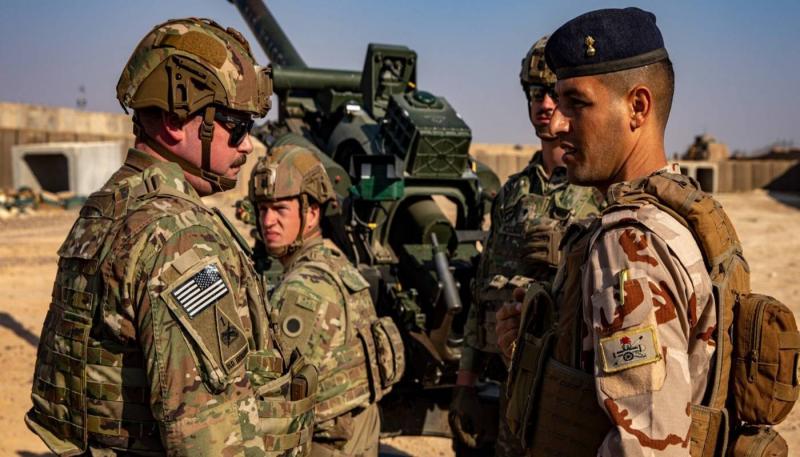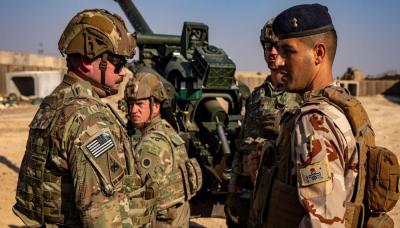The English-language newspaper "The National" reported that indirect talks between the United States and Iran are aiming to build upon an unannounced ceasefire understanding in Iraq with armed Iraqi factions, expanding it to apply to other fronts in the region. The report mentioned that Iranian media confirmed the recent rounds of indirect talks with the United States, but indicated that the focus is on the issue of lifting sanctions imposed on Iran, which are believed to be the main incentive for Tehran's increasing initiative to reduce regional conflict.
A source familiar with the talks commented that "there are clear American efforts for the Iranians to maintain the relative restraint they have been exercising on their part, especially on the Iraqi front, where an unofficial ceasefire has been ongoing for more than a month." The report noted that Washington recently renewed the sanctions exemption allowing Iran access to $10 billion of frozen funds, which enables Tehran to use electricity revenues from Iraq to support its budget and pay debts; this follows a similar exemption made four months prior.
Regarding Hezbollah's position on the situation in Gaza, the report cited a source close to "Hezbollah" in Lebanon, stating that this exemption appears to be one indication of President Joe Biden's administration "showing its willingness to gain favor with the Iranians during this sensitive period of the war in Gaza, especially as the drums of electoral warfare begin to sound in the United States," adding that "Biden does not appear ready for a major adventure that could consume more of his political capital."
The report highlighted that Washington and Tehran have engaged in talks through intermediaries in Oman, Geneva, and other cities concerning Tehran's nuclear ambitions, ballistic missile program, and regional influence. However, it stated that recent talks in Oman shifted towards maintaining regional security and finding ways to prevent a large-scale war in the Middle East following Hamas's attack on October 7, which sparked the Israel-Gaza war and led to the mobilization of Iran-aligned armed factions throughout the region.
The report mentioned that armed factions in Iraq and Syria launched attacks on American forces as part of a coordinated front since the outbreak of the Gaza war, pressuring for an immediate ceasefire in the Palestinian territories. It continued, citing sources in Baghdad and Beirut, that the last strike carried out by these factions was on February 4, adding that the halting of attacks against American forces was part of an "unannounced ceasefire" that included Tehran and the Iraqi government, following an attack that killed three Americans on the Jordanian-Syrian border, which Washington attributed to the "Islamic Resistance in Iraq," supported by Iran, including "Hezbollah Brigades."
The report highlighted that Quds Force commander Ismail Qaani traveled to Baghdad to meet with faction leaders to push for a swift resolution. Shortly afterward, Hezbollah Brigades announced a suspension of their military operations against American forces in Syria and Iraq to prevent "any embarrassment" to the government in Baghdad, while a source in Beirut, close to the anti-Israel front, noted that "it is hard not to imagine that the Americans are part of that."
The report indicated that Hezbollah in Lebanon is conducting a controlled war of attrition against Israel, while the United States has invested significant efforts to secure a ceasefire and prevent the escalation of conflict, as such a war could have devastating consequences for Lebanon and Israel and potentially ignite a wider regional confrontation.
The report added that while Hezbollah rejects attempts mediated by the U.S. to call for a ceasefire before achieving a cessation of hostilities in Gaza, the party has also not shown significant interest in getting embroiled in a major war with Israel. Recently, Israel has conducted deeper strikes inside Lebanon to push Hezbollah away from the south using tactics officials described as both diplomatic and military.
The report cited sources in Beirut, involved in ongoing diplomatic efforts, stating that arrangements to begin negotiations to resolve the border conflict between Lebanon and Israel are progressing despite fears of a large-scale war with Hezbollah, with U.S. envoy Amos Hochstein and Lebanese Speaker Nabih Berri, a leader of the Amal Movement close to Hezbollah, mediating the deal, as there is no direct American communication with Hezbollah.
According to political sources close to Hezbollah, Ismail Qaani has visited Lebanon several times in recent months to meet with Hezbollah leader Hassan Nasrallah and discuss ways to continue pressure on Israel without entering into a wide-scale war. However, one source stated that "the Iranians did not go to tell Nasrallah: we do not want to get involved in a war with Israel." Instead, they went to coordinate operations with the Quds Force (in collaboration with Hezbollah).
The report mentioned that American and Iranian officials told the "Financial Times" last week that the United States held secret talks with Iran in January in Oman to try to convince Tehran to use its influence over the Houthi movement in Yemen to end attacks on ships in the Red Sea.
Despite this, a senior Western diplomat who recently toured the front lines between Israel and Lebanon expressed skepticism about Washington's ability to limit the conflict's regional influence, especially in Lebanon, stating that "the regional war is already ongoing," referring to the front between Hezbollah and Israel, and adding that the Gaza war revealed Israel's weakness in facing multi-faceted attacks from Iran-aligned factions, as Hezbollah possesses superior military tunnels and missile capabilities compared to Hamas.
The report continued that the existential threat posed by Hezbollah's attacks following October 7, which manifested in tens of thousands of Israeli residents being unable to return to their northern border towns, highlights Israel's motivations to push its enemy back. A knowledgeable source stated, "The only way to deal with this threat is to push Hezbollah significantly away from the border; it does not matter whether the Americans agree to that, because the Israelis do not listen to them anyway."




